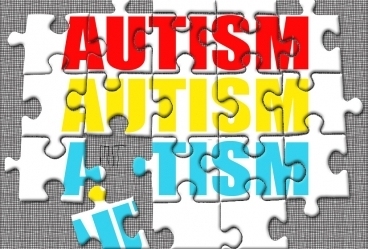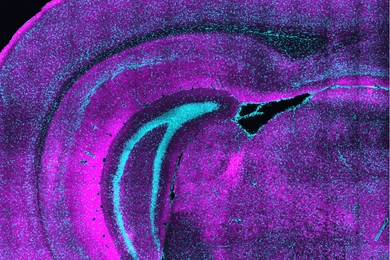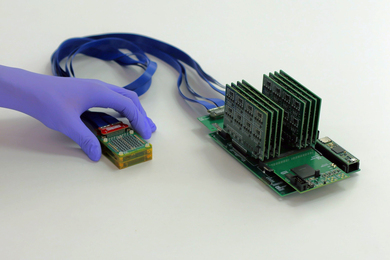MIT has received a $26.5 million gift from the Simons Foundation to create the Simons Center for the Social Brain at MIT, a new initiative that aims to not only catalyze innovative research on the social brain, but also translate that work into the improved diagnosis and treatment of autism spectrum disorders (ASD).
The Simons Center is a significant addition to the Boston and Cambridge area’s already impressive hub of research in autism. It will work in partnership with the Simons Foundation Autism Research Initiative, which in turn brings together many academic and medical institutions to better understand autism spectrum disorders.
ASD, which refers to a group of complex neurodevelopmental disorders that cause social, communication and behavioral impairments in children and adults, currently affects one in 110 children in the United States. ASD has had a substantial economic impact on society, with the lifetime cost of care for those with ASD exceeding $3 million per person.
“Through visionary gifts to MIT, Jim and Marilyn Simons, together with the Simons Foundation, have created powerful momentum in the drive to understand and, ultimately, treat autism,” said MIT President Susan Hockfield. “In launching the Simons Center for the Social Brain, the Simons Foundation advances our boldest ambitions to define new routes to understanding the brain and mind, and to lift the burden of ASD for individuals and their families.”
Marian Carlson, deputy director of life sciences at the Simons Foundation, said, "We expect that the Simons Center will accelerate progress by engaging researchers from diverse disciplines across MIT."
Gerald D. Fischbach, scientific director of the Simons Foundation, explains, "The goal of the Simons Center for the Social Brain at MIT is to understand the neural mechanisms underlying social cognition and behavior, and to translate this knowledge into better diagnosis and treatment of autism spectrum disorders. Neural correlates of social cognition and behavior exist in diverse species, and the underlying mechanisms will be studied in both humans and relevant model organisms and systems."
The new gift is the latest in a series of gifts to MIT from Jim (’58) and Marilyn Simons, and from the Simons Foundation. Over the past six years, they have granted MIT nearly $15 million in support of autism research, including a 2009 gift of $4.5 million to establish the Simons Initiative on Autism and the Brain at MIT. It was progress from that initiative, which concludes at the end of 2011, that paved the way for the new center.
“MIT has all the ingredients necessary for making spectacular progress in understanding and treating autism: top-notch basic science, intensely creative technology and longstanding collaborations with Boston-area hospitals and clinics,” said Mriganka Sur, the Lilah and Paul E. Newton Professor of Neuroscience and head of the Department of Brain and Cognitive Sciences. Sur will lead the new center, which is open to participation by all interested faculty and other researchers.
“MIT researchers have already discovered new genes contributing to autism risk, used new ways of brain imaging to reveal the cognitive systems disengaged in autism, and discovered therapeutic approaches for two subsets of autism. The latter are currently being tested in clinical trials. With the new center, we expect to multiply this rate of progress several-fold,” said Dean of Science Marc Kastner.
High-risk, high-payoff projects
The new center aims to carry out high-risk, high-payoff projects that have the potential to significantly impact the diagnosis and treatment of autism well into the future. Multilevel research teams will concurrently target specific problems that represent grand but solvable challenges for the field, such as identifying specific genetic conditions underlying subsets of autism. These teams will engage large numbers of researchers, integrate multiple levels of inquiry and analysis, and potentially span multiple institutions.
First, however, the center will build the infrastructure for its mission by developing programs that represent four major research areas. Those areas are: genetics and gene discovery, models and mechanisms, cognitive neuroscience, and translation and therapeutics. MIT has special strengths — especially in tools and technologies, and computation and theory — that make the Institute uniquely placed to generate advances in each of these areas.
The Simons Foundation is a private foundation based in New York City, founded in 1994 by Jim and Marilyn Simons. Marilyn Simons has worked primarily in the nonprofit sector as a volunteer for the past 20 years. She holds a BA and a PhD in economics from the State University of New York at Stony Brook. Jim Simons is the former CEO of Renaissance Technologies LLC. Prior to his financial career, he served as chairman of the Mathematics Department at SUNY Stony Brook and taught mathematics at MIT and Harvard University. He holds an SB from MIT and a PhD from the University of California at Berkeley, and is a Life Member of the MIT Corporation.
The Simons Center is a significant addition to the Boston and Cambridge area’s already impressive hub of research in autism. It will work in partnership with the Simons Foundation Autism Research Initiative, which in turn brings together many academic and medical institutions to better understand autism spectrum disorders.
ASD, which refers to a group of complex neurodevelopmental disorders that cause social, communication and behavioral impairments in children and adults, currently affects one in 110 children in the United States. ASD has had a substantial economic impact on society, with the lifetime cost of care for those with ASD exceeding $3 million per person.
“Through visionary gifts to MIT, Jim and Marilyn Simons, together with the Simons Foundation, have created powerful momentum in the drive to understand and, ultimately, treat autism,” said MIT President Susan Hockfield. “In launching the Simons Center for the Social Brain, the Simons Foundation advances our boldest ambitions to define new routes to understanding the brain and mind, and to lift the burden of ASD for individuals and their families.”
Marian Carlson, deputy director of life sciences at the Simons Foundation, said, "We expect that the Simons Center will accelerate progress by engaging researchers from diverse disciplines across MIT."
Gerald D. Fischbach, scientific director of the Simons Foundation, explains, "The goal of the Simons Center for the Social Brain at MIT is to understand the neural mechanisms underlying social cognition and behavior, and to translate this knowledge into better diagnosis and treatment of autism spectrum disorders. Neural correlates of social cognition and behavior exist in diverse species, and the underlying mechanisms will be studied in both humans and relevant model organisms and systems."
The new gift is the latest in a series of gifts to MIT from Jim (’58) and Marilyn Simons, and from the Simons Foundation. Over the past six years, they have granted MIT nearly $15 million in support of autism research, including a 2009 gift of $4.5 million to establish the Simons Initiative on Autism and the Brain at MIT. It was progress from that initiative, which concludes at the end of 2011, that paved the way for the new center.
“MIT has all the ingredients necessary for making spectacular progress in understanding and treating autism: top-notch basic science, intensely creative technology and longstanding collaborations with Boston-area hospitals and clinics,” said Mriganka Sur, the Lilah and Paul E. Newton Professor of Neuroscience and head of the Department of Brain and Cognitive Sciences. Sur will lead the new center, which is open to participation by all interested faculty and other researchers.
“MIT researchers have already discovered new genes contributing to autism risk, used new ways of brain imaging to reveal the cognitive systems disengaged in autism, and discovered therapeutic approaches for two subsets of autism. The latter are currently being tested in clinical trials. With the new center, we expect to multiply this rate of progress several-fold,” said Dean of Science Marc Kastner.
High-risk, high-payoff projects
The new center aims to carry out high-risk, high-payoff projects that have the potential to significantly impact the diagnosis and treatment of autism well into the future. Multilevel research teams will concurrently target specific problems that represent grand but solvable challenges for the field, such as identifying specific genetic conditions underlying subsets of autism. These teams will engage large numbers of researchers, integrate multiple levels of inquiry and analysis, and potentially span multiple institutions.
First, however, the center will build the infrastructure for its mission by developing programs that represent four major research areas. Those areas are: genetics and gene discovery, models and mechanisms, cognitive neuroscience, and translation and therapeutics. MIT has special strengths — especially in tools and technologies, and computation and theory — that make the Institute uniquely placed to generate advances in each of these areas.
The Simons Foundation is a private foundation based in New York City, founded in 1994 by Jim and Marilyn Simons. Marilyn Simons has worked primarily in the nonprofit sector as a volunteer for the past 20 years. She holds a BA and a PhD in economics from the State University of New York at Stony Brook. Jim Simons is the former CEO of Renaissance Technologies LLC. Prior to his financial career, he served as chairman of the Mathematics Department at SUNY Stony Brook and taught mathematics at MIT and Harvard University. He holds an SB from MIT and a PhD from the University of California at Berkeley, and is a Life Member of the MIT Corporation.






